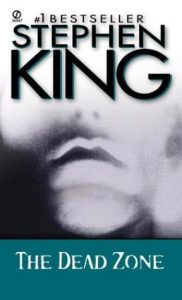The Stephen King Project – The Dead Zone (1979)
About the project
I will be reading all of Stephen King’s books in order of publication (with the exception of The Dark Tower series which I will read together, at the end of this adventure) and writing a review of each. I’ll be looking at the recurring themes, the tricks he likes to use, the way he develops character and the way that his craft has evolved in the 44 years since Carrie was first published.
There are so many things to say about The Dead Zone that I don’t quite know where to start. Reading it now, in 2018, it feels somewhat prophetic and I doubt I’m the only person who wishes there really was a Johnny Smith to save us.
 First, I’ll say that from a technical perspective, this is probably one of King’s best books. Plotting is tight through-out with the three strands of the story woven together beautifully. The pacing is spot on and the pop culture references plant it firmly in time. The characters are wonderful, as is always my feeling when reading King.
First, I’ll say that from a technical perspective, this is probably one of King’s best books. Plotting is tight through-out with the three strands of the story woven together beautifully. The pacing is spot on and the pop culture references plant it firmly in time. The characters are wonderful, as is always my feeling when reading King.
This book has tension in spades and plenty of edge-of-your-seat moments but the overwhelming feeling it left me with was sadness. I cried at more than one point of the book. The lost love between Johnny and Sarah just hurts so much and, even though I’ve read this book a couple of times now, I somehow kept hoping that the ending would magically change and leave those two in peace to live out their lives together. Of course, then the story would be over very quickly.
Johnny Smith is an Everyman protagonist. In some ways he reminds me of Stu Redman in The Stand: a decent man forced by circumstances into horrible situations and doing what he considers to be the right thing – whatever the cost to him. After a childhood head injury, Johnny receives occasional flashes of insight that are so far apart that he doesn’t even recognise them for what they are. Until one night at the fair, when he has an incredible string of luck playing the Wheel of Fortune. Johnny’s luck tales a turn for the worse on the way home when he has a car accident that leads to a coma.
Johnny wakes up after four and a half years to discover a changed world. His mother, who was always a bit fervent in her religious views, has developed a sort of religious mania which leads her to do foolish things. The political landscape has changed. His body has atrophied to a state from which he may never fully recover. And the love of his life is married with children.
In a just world, that would be the end of Johnny’s bad luck, but of course, it isn’t. He has come out of the coma with a wild talent – one that he can neither control nor ignore. When he touches people, he can see things about them. In some cases, it’s about their past, as is the case with one of his doctors. Sometimes it’s about something happening now, as with the physical therapist whose house is on fire. And in some cases it’s about the person’s future, as with the villain of the tale, Greg Stillson.
Reading the book now, it’s hard not to see echoes of our current political situation in the character of Greg Stillson and the terrifying future Johnny sees if Stillson comes into power. I suspect that in this way the book is even more frightening now than when it was first released in 1979.
Repeatedly throughout the book, Johnny is put in the position where he has knowledge that could save lives, but to act on it puts him in the public eye in a way that is deeply uncomfortable for him and eventually causes the loss of his second love in life: teaching. Every time Johnny starts to hope for a quiet, normal life, something happens to rip it away from him. He is constantly faced with the question of how much to do in the face of his strange knowledge.
Johnny eventually becomes obsessed with the question: If you could go back in time and kill Hitler before he came to power, would you?
This is a theme that King explores in later work as well – in particular I’m thinking of 11/22/63, in which the protagonist goes back in time to save JFK.
If you know the future, can you change it? And assuming that you can, should you change it?
The book doesn’t reach any firm conclusions on that count and has a truly bittersweet ending where the protagonist is successful but the cost is ridiculously high.
A gripping, poignant novel that everyone should read – but have a pack of tissues handy. You’ll need them.
The next book in this readthrough is Firestarter, a novel that I read a few years ago and was fairly indifferent to. I thought it was a competent novel and an enjoyable enough read but not up to King’s usual standards. I’ll be interested to see if that opinion has changed any.
